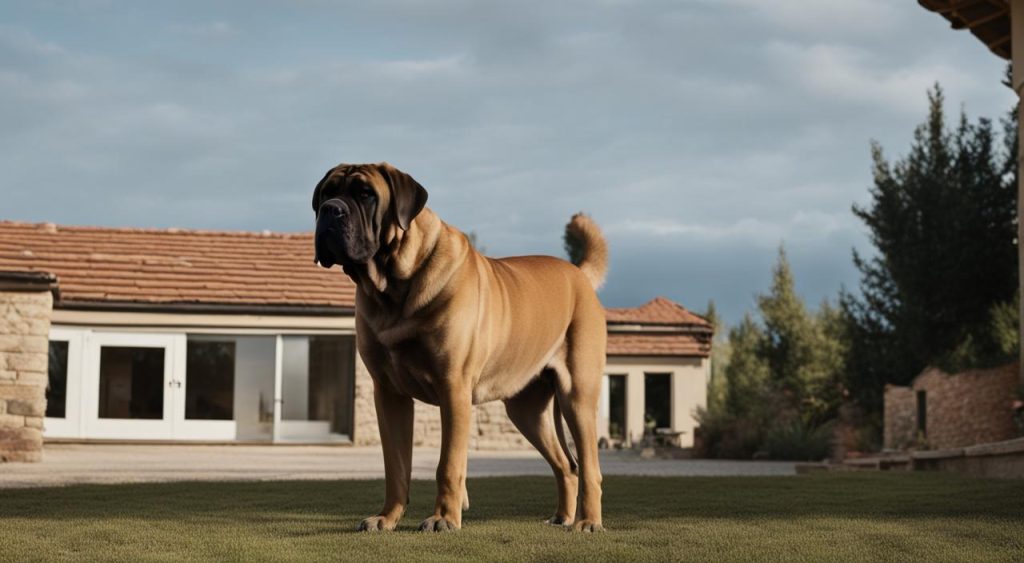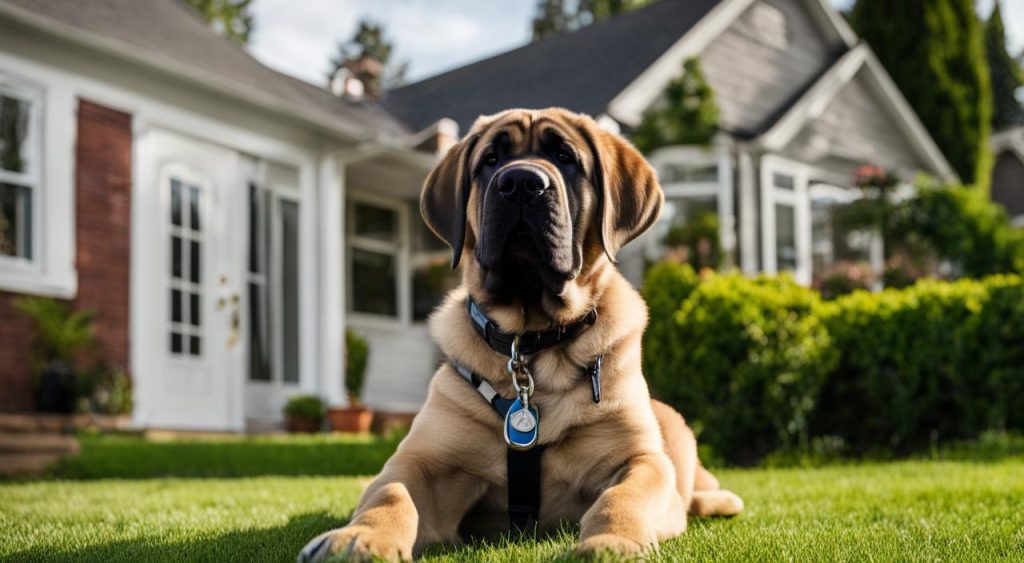Mastiffs are known for their history as hunters and guardians in Europe. They are a popular giant dog breed, with males reaching up to 30 inches in height and weighing between 120-230 pounds. Despite their size, Mastiffs have a gentle and lovable nature. They are loyal and watchful over their families, making them great companions. However, early training and socialization are essential to have a well-mannered Mastiff.
Mastiffs have a moderate shedding coat that requires minimal grooming, but they are known to be excessive droolers. The breed is prone to various health issues, including allergies, eye anomalies, cancer, hip dysplasia, degenerative myelopathy, epilepsy, and gastric dilatation and volvulus (GDV). When it comes to feeding, Mastiffs do well on a dog food approved by the Association of American Feed Control Officials (AAFCO) and formulated for large breeds. They should be fed 2-3 meals per day, and precautions should be taken to prevent GDV, which can be a life-threatening condition.
Overall, Mastiffs are not excessive barkers, but proper training and socialization are important to manage their barking behavior.
Key Takeaways:
- Mastiffs are not known for excessive barking, but proper training and socialization are important to manage their behavior.
- They have a moderate shedding coat and are prone to various health issues.
- Mastiffs should be fed a diet approved for large breeds and be mindful of GDV.
- Early training and socialization are crucial for well-mannered Mastiffs.
- Proper care and regular veterinary check-ups are necessary for the breed’s well-being.
Training and Behavior Tips for Mastiffs
Mastiffs have a calm and patient personality, making them great family dogs. They are generally well-behaved but require early training and socialization to prevent any issues.
Training sessions should be kept short and focused, using positive reinforcement methods. Mastiffs are eager to please and respond well to food rewards. Be consistent and patient in your training approach to achieve the best results.
Proper socialization is crucial to teach Mastiffs how to interact with other dogs and people. Expose them to different environments and experiences from an early age, introducing them gradually and positively. This will help prevent any potential behavioral problems in the future.
Barking Control
While Mastiffs are not known for excessive barking, some individuals may develop barking habits. To control their barking behavior, you can follow these tips:
- Identify the triggers: Observe when and why your Mastiff barks. This will help you understand the underlying cause of the behavior.
- Redirect attention: Provide your Mastiff with alternative activities or toys to divert their attention from barking. This can help in breaking the barking habit.
- Positive reinforcement: Reward your Mastiff whenever they remain calm and quiet, instead of barking unnecessarily. Use treats or praise to reinforce the desired behavior.
- Seek professional help: If your Mastiff’s barking behavior becomes problematic or excessive, consider consulting with a professional dog trainer or behaviorist. They can provide personalized guidance and training techniques.
Fun Activities and Grooming
In addition to training, Mastiffs enjoy various activities that stimulate their minds and bodies. Some fun activities you can engage in include pulling carts, obedience training, tracking, and search and rescue activities. These activities not only provide physical exercise but also mental stimulation for your Mastiff.
When it comes to grooming, Mastiffs have a short coat that is low-maintenance. Regular brushing will help keep their coat clean and remove any loose hair. However, it’s important to note that Mastiffs are excessive droolers. This requires regular cleaning and maintenance to prevent any discomfort or hygiene issues.
By providing early training, socialization, and engaging activities, along with proper grooming, you can ensure that your Mastiff grows up to be a well-behaved and happy companion.
Pros and Cons of Owning an English Mastiff
The English Mastiff breed has its own unique set of advantages and disadvantages. Understanding these pros and cons can help you make an informed decision about whether an English Mastiff is the right dog for you.
Pros:
1. Gentle and Loyal Nature: English Mastiffs are known for their gentle and loyal nature, making them excellent family dogs. They are dedicated and protective, forming strong bonds with their owners.
2. Exercise Requirements: Unlike some high-energy breeds, English Mastiffs do not require extensive exercise. They are generally content with moderate walks and indoor playtime.
3. Trainability: English Mastiffs are intelligent and eager to please, making them relatively easy to train. Consistent positive reinforcement methods work well with this breed.
4. Sociability: English Mastiffs thrive on companionship and enjoy being part of the family. They are social dogs that get along well with children and other animals when properly socialized.
Cons:
1. Shedding: English Mastiffs have a dense double coat that sheds heavily, particularly during shedding seasons. Regular grooming and vacuuming may be necessary to manage the shedding.
2. Excessive Drooling: It’s no secret that English Mastiffs drool quite a bit. If you’re not keen on dealing with the occasional “slobber trails,” this may be a drawback for you.
3. Health Issues: English Mastiffs are prone to certain health issues, including hip dysplasia, bloat, and heart problems. These conditions may require regular veterinary care and can be costly to treat.
4. Cost of Ownership: English Mastiffs are a large breed and require a significant amount of food, which can be expensive. Additionally, their size may result in higher costs for medications, veterinary care, and supplies.
While English Mastiffs have their share of challenges, their affectionate and loyal nature can make them wonderful companions for the right owners. Consider these pros and cons carefully to determine whether an English Mastiff aligns with your lifestyle and preferences.
Conclusion
When it comes to barking, Mastiffs are not known for being excessive. However, it’s still crucial to provide them with proper training and socialization to manage their behavior. These loyal and gentle giants make wonderful family dogs, but they require minimal grooming. The challenge comes with their excessive drooling. It’s important to be prepared for this aspect of their care.
Another critical factor to consider with Mastiffs is their susceptibility to various health issues. Regular veterinary check-ups and proper care are essential to keep them healthy and happy. English Mastiffs, in particular, have their own set of pros and cons. Their size, shedding, drooling, and health issues should be carefully weighed before making a decision.
Despite these considerations, Mastiffs can be fantastic pets if you provide them with the right training, socialization, and care. If you’re looking for a loyal family companion who will be a gentle giant, Mastiffs may be the perfect fit for you. Just be prepared for their drooling, and make sure to prioritize their health and well-being. With the right approach, Mastiffs can bring years of love and companionship into your home.





